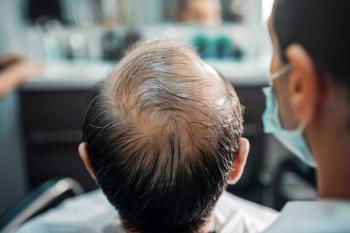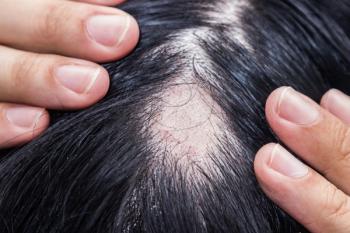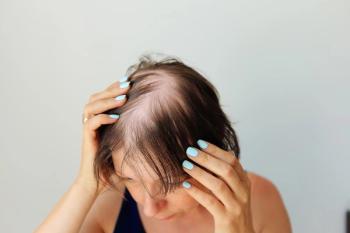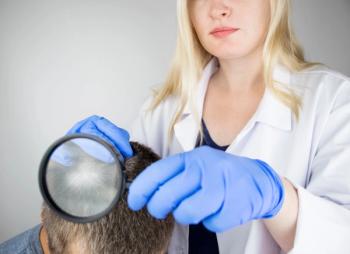
Alopecia
Latest News
Latest Videos
CME Content
More News

Alopecia areata significantly impacts quality of life, driven by appearance-related anxiety related to where hair loss occurs more than how much is lost.

Baricitinib shows promising results for severe alopecia areata, with more than half of patients experiencing significant hair regrowth within a year.

Early phototherapy significantly enhances hair regrowth in alopecia areata, especially when started within a year of symptom onset.

These were the most-read articles on alopecia areata in 2025.

Clascoterone 5% topical solution shows promise as a new treatment for male androgenetic alopecia, offering significant hair growth improvements with minimal side effects.

New research reveals ritlecitinib's potential to reverse scarring alopecias by targeting inflammation, offering hope for hair regrowth in autoimmune disorders.

Baricitinib demonstrated significant reductions in disease activity in postmenopausal women with frontal fibrosing alopecia over 12 weeks.

Ritlecitinib significantly improves hair regrowth and reduces psychosocial burdens in patients with alopecia areata, enhancing emotional well-being over time.

In the phase 3 BRAVE-AA-PEDS trial, baricitinib led to significant scalp, eyelash, and eyebrow hair regrowth at 1 year in adolescents with alopecia areata.

Hair loss disorder can lead to a significant psychological and emotional burden that warrants more attention, new research suggests.

Deuruxolitinib 8 mg BID was found to be the most effective oral JAK inhibitor for severe alopecia areata in a new meta-analysis.

The trial evaluates ritlecitinib's efficacy for severe alopecia areata, utilizing innovative external placebo controls for enhanced patient outcomes.

An innovative artificial intelligence (AI) tool enhanced alopecia areata assessment and improved treatment adherence.

Among survey respondents, approximately 80% reported experiencing stigma, including feelings of embarrassment, negative judgment, or being treated differently, because of their condition.

The findings add confidence to the role of ritlecitinib as a treatment option for severe alopecia areata while pointing the way toward more personalized approaches.

Clonally expanded CD8+ T cells appear to play a causal role in the initiation and progression of alopecia areata.

Patients with alopecia universalis and alopecia totalis are at a particularly high risk of cardiovascular disease, a new study has found.

Hair and scalp disorders in patients with skin of color are frequently misdiagnosed, often due to educational gaps and premature diagnosis, with scalp biopsy proving more reliable than trichoscopy for accurate diagnosis.

The trial is one of 2 phase 3 studies of upadacitinib in patients with severe alopecia areata.

Janus kinase inhibitors can be paired with corticosteroids or used as monotherapy in the treatment of alopecia areata.

The research showed that certain females—but not males—were at a higher risk of anxiety and depression.

Investigators found that Janus kinase inhibitors were effective in a dose-dependent manner.

Racial and ethnic disparities are found among Asian individuals as they experience the highest lifetime incidence of alopecia areata, and Black individuals face a disproportionately higher risk of anxiety disorders associated with the condition.

The most-read alopecia articles include topics on Janus kinase inhibitors, new therapeutic strategies, health-related quality of life measurements, potential links to the COVID-19 vaccine, and disease pathogenesis.

Deuruxolitinib showed significant efficacy and safety in hair regrowth stimulation among adult patients with alopecia areata, particularly in those with moderate to severe hair loss.










